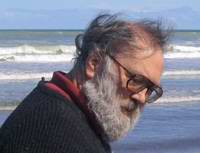Joel Goldsmith put it as succinctly as anybody ever has. There is no such thing as "God and..." This is the essence of the unitive experience of the mystic, the source of his certainty that physical death is not the end for him. There exists something immeasurably vast of which he partakes, of which he is a manifestation, and with which he shares his identity.
If you believe you are separate from God, if you believe that anybody else is separate from God, if you believe that you are separate from any other part of this universe, then, amen, so be it. There is lots of apparent evidence to support this view.
But the separation is illusory. The world of independent isolated beings, families, tribes, nations, and so forth, the world of individual animals and trees and plants and micro-organisms, the world as most of us experience it nearly all of the time is an illusion. The Hindus speak of it as maya.
Buddhists view the notion of ego-consciousness defined as an autonomous, separate self apart from the whole, as an illusion that is the root cause of suffering in the world.
We are trapped in this illusory world because we depend on our physical senses, on our emotional responses and on our thinking to provide us with information about the universe, and through those vehicles we quite properly understand ourselves to be separate, and we also believe our perception of the world to be complete.
It is not until we come to know ourselves as soul and spirit that we gain access to a world "beyond", and most of us, when we become aware of it, describe it as a "real" world in comparison with what we have known. Goldsmith used the word, "discernment", to characterise the particular way in which we come to know this world.
The problem for me has always been that we do not just acquire a richer representation of the world we previously knew. We don't just "know more". In the end we arrive at a "reality" that often seems at odds with our previous experience.
Now all of the above has been repeated elsewhere on this site, sometimes better expressed, sometimes not. What I came to the other day was an insight, by no means new, except for me, about the relationship between this "real" world and the language we use to communicate information in our possession to other people.
If there is no such thing as "God and," how can a language that depends on singular and plural, of all kinds, that depends on conjunctions, subjects and objects, one that depends on past, present and future verb forms, etc., adequately communicate the essence of a unitive experience in which these distinctions dissolve.
The same applies in our representation of time. Language deals essentially with the past and the future. It is not equipped to communicate what is happening "now" until after it has happened, when a series of moment to moment events coalesce to assume an identity over time, and built on our history with that event.
It is not equipped to deal with that state reported by mystics in which past history and future expectations or intentions disappear in a timeless and absolute now.
Language has really not evolved to represent spiritual experience.



